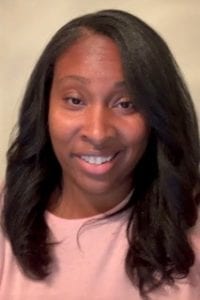 The Chicago School opened its Dallas Campus in the fall of 2018 in response to increased demands in the Dallas/Fort Worth metropolitan areas for programs in psychology and behavioral health sciences.
The Chicago School opened its Dallas Campus in the fall of 2018 in response to increased demands in the Dallas/Fort Worth metropolitan areas for programs in psychology and behavioral health sciences.
Beginning in the fall of 2021, the campus will expand its offerings to include an M.A. in Clinical Mental Health Counseling. Job growth for mental health counselors is expected to be faster-than-average in the coming decade, according to the Bureau of Labor Statistics.
In this series, we spotlight Clinical Mental Health Counseling faculty at our Dallas Campus. We had a chance to learn more about Nicole West, Ph.D., an adjunct faculty member, who shares her experience of The Chicago School.
Tell us about your professional background. How did you get into mental health counseling?
I majored in psychology and public health at Temple University, and then I went to grad school at LaSalle University for clinical counseling. After graduation, I wanted to gain some experience in the field. I did behavioral consulting, in-home therapy, and worked with veterans.
You also have a background in trauma therapy. Can you tell me about that?
Yes. I worked with teachers to help them understand the impact of trauma on a child’s development. The main goal was to teach them strategies and techniques to use in the classroom to prevent or decrease some of those behaviors that are a result of trauma.
How does your background in trauma inform your work now with graduate students?
Incorporating information about trauma is always relevant for each counseling course. For The Chicago School, I’m teaching a developmental course where we discuss how development changes as we age and mature. When we’re talking about younger stages of development, trauma just fits right in there because kids might have issues with neglect, abuse, community violence, domestic violence, or any of those things. It’s a really important part of the curriculum too—to be aware of new research about trauma, know what it looks like, and how those changes can follow you throughout your lifespan.
What do you think sets The Chicago School’s Mental Health Counseling program apart?
The biggest difference would be the speed at which these classes are taught. Teaching these eight-week courses can feel really fast. But I’ve noticed that students are really good about taking care of themselves throughout those eight weeks. The Chicago School does a good job of really preparing students in the beginning of the program to let them know what this is going to look like and how to take care of themselves. I feel like that sets it apart from any other schools I’ve attended and taught at. You don’t really get that sense of taking care of students on the front end. The Chicago School offers that.
How would you describe the average The Chicago School student?
A lot of the students in my class have relocated to be a part of this program. They all have a passion for working in the helping profession. Most of them have had some experience in it, whether it was at DCS, in the criminal justice system, or at other mental health agencies.
In addition to the theoretical work, what kind of hands-on component do you incorporate in your classes?
The class I teach is primarily online and part of the class is asynchronous. But we have an hour and a half where we all come together on Saturday mornings. During those sessions, I try to incorporate practical ways to apply what we’ve talked about or what they have learned during that week for the module. Last week, for example, we were on the young adulthood module. We talked about different games you can play to help teenagers open up and build a rapport. Then we discussed what would these games look like with younger kids? What does it look like adult populations? What are some of the strategies that you can use for each age group, keeping in mind the different developmental stages? I try to give them an idea of what the material will look like once they actually put it to practice.
The class sizes tend to be small. Is there a close relationship among the group and professors?
Yes. Students’ core cohort goes through the same sequence together and so they have grown really close. They all seem to feel really comfortable with each other and with contributing to the discussion. It makes sense because they’re all going through this really rigorous experience together.
What is the takeaway you hope students receive when they graduate?
That there isn’t really a right or wrong way to do this. We all have different personalities and we all bring different things to the table. The most important part of therapy really is the relationship you establish and not necessarily the techniques you use. Keep in mind and apply all the techniques you’ve learned but also be genuine in the room with the client. You will develop your own style and that is totally OK. That is the way it should be.
What is your own philosophy as a professor?
I learn things from my students every day that are valuable. We are all lifelong learners, and we have an amazing opportunity to learn from each other. There’s always room for growth and learning should be a reciprocal action. I learn from them and they learn from me. That’s pretty cool.

